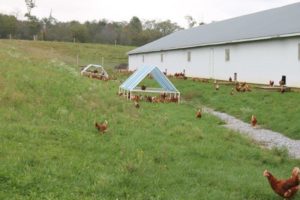Pete and Gerry’s

| Total Score | 1915 |
Pete and Gerry’s is an example of a large-scale producer that is moving away from the industrial model of egg production, committed instead to increasing both indoor and outdoor access for its birds. At its New Hampshire location, the company has attached winter gardens (like a screened-in porch for chickens) to all its organic buildings, and increased vegetated outdoor space as well.
They write: Pete and Gerry’s Organic Eggs is a family owned and operated farm and processor of organic eggs, located in Northern New Hampshire, near the White Mountain National Forest. Pete and Gerry’s was the first egg farm in the country to be recognized by Humane Farm Animal Care’s Certified Humane program. Along with producing eggs at the family farm in Monroe, NH, Pete and Gerry’s has been able to grow by partnering with nearly 20 other family farms throughout the Northeast. Pete and Gerry’s is also actively pursuing and supporting new partnerships with local New England based farmers who would like to produce eggs with us.
| Ownership Structure | 70 |
| Average Flock Size | 40 |
| Single or Double Henhouses | 100 |
| Other Certifications (bonus points) | 60 |
| Organic Certifier | 85 |
| Commitment to Organics | 80 |
| Indoor Space per Bird | 50 |
| Indoor Enrichments | 80 |
| Litter Management | 80 |
| Natural Light | 80 |
| Outdoor Space per Bird | 40 |
| Popholes/Exit to the Outdoors | 40 |
| Outdoor Enrichments | 80 |
| Outdoor Space Exemptions | 70 |
| Outdoor Management System | 60 |
| Manure Handling System | 80 |
| Forced Molting | 100 |
| Beak Trimming | 70 |
| Laying Hen Lifespan | 60 |
| Use of Spent Hens | 100 |
| Death Loss Rate | 100 |
| Pullets | 60 |
| Pullet Access to Outdoors | 40 |
| Feed Produced on Farm | 50 |
| US Grown Feed | 70 |
| Soy in Feed | Yes |
| Synthetic Amino Acids | 70 |
| Disclosure Rate | 100 |

